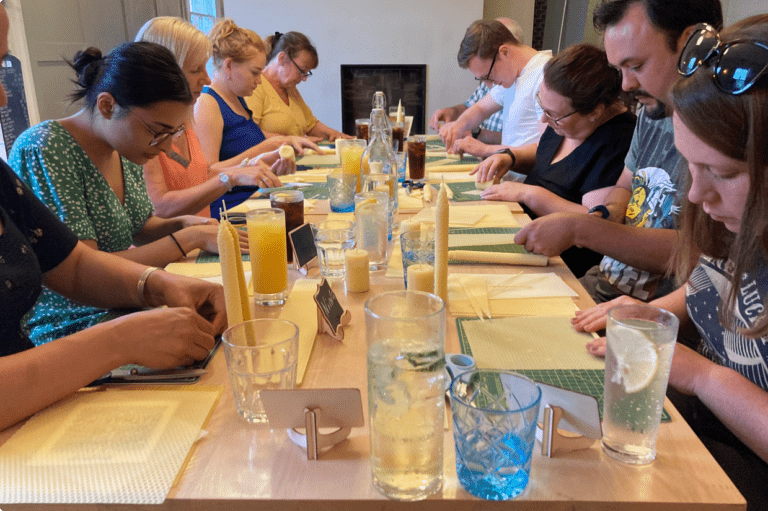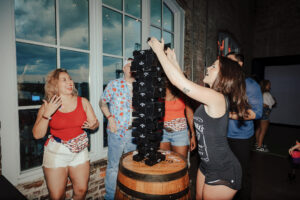From ticket-pricing to providing added value, and from building a community to identifying collaborations, we meet three creators who host their events at F&B (food and beverage) venues and ask for their best practice advice.
In a bid to reduce overheads and add a social element to their events, organisers are looking beyond traditional spaces and finding a host of restaurants, cafes, bars and pubs that are willing to open their doors to a growing schedule of live classes, workshops and activities.
So, how can you identify a suitable venue and come to an agreement that enables you to start marketing your events to potential attendees? Meet Viki of Twiddle, who runs Italian-themed cooking classes from a restaurant in Sheffield, Logan Gunasingham, the mastermind behind REZtron’s popular gaming brunches, and Catherine Dolan of Handmade Workshops, who has hosted almost 300 creative classes in pubs across south-west London. These three experienced event organisers have been working with local businesses for several years – continually nurturing relationships and evolving their offerings along the way.
Here are six key lessons you can learn from them:
- Know what you need from a venue
Understanding what’s needed to run your event – and what elements will result in the best possible experience for attendees – is key, says Catherine, who recommends organisers compile a checklist of requirements before visiting any potential venue:
“We want to provide a fun experience, not a classroom environment – so a pub is the perfect place to learn to crochet over a glass of wine. And because we host small groups – usually a maximum of eight people – large, open-plan venues don’t usually work. We need an area that’s away from the rest of the action like an alcove or a booth. We book places on nights when they would normally be quiet, basically Monday to Wednesday, and we make sure our events don’t coincide with quizzes. We ask ourselves: do they play loud music, can we see large TV screens? Because it won’t work if there’s a big football night.”
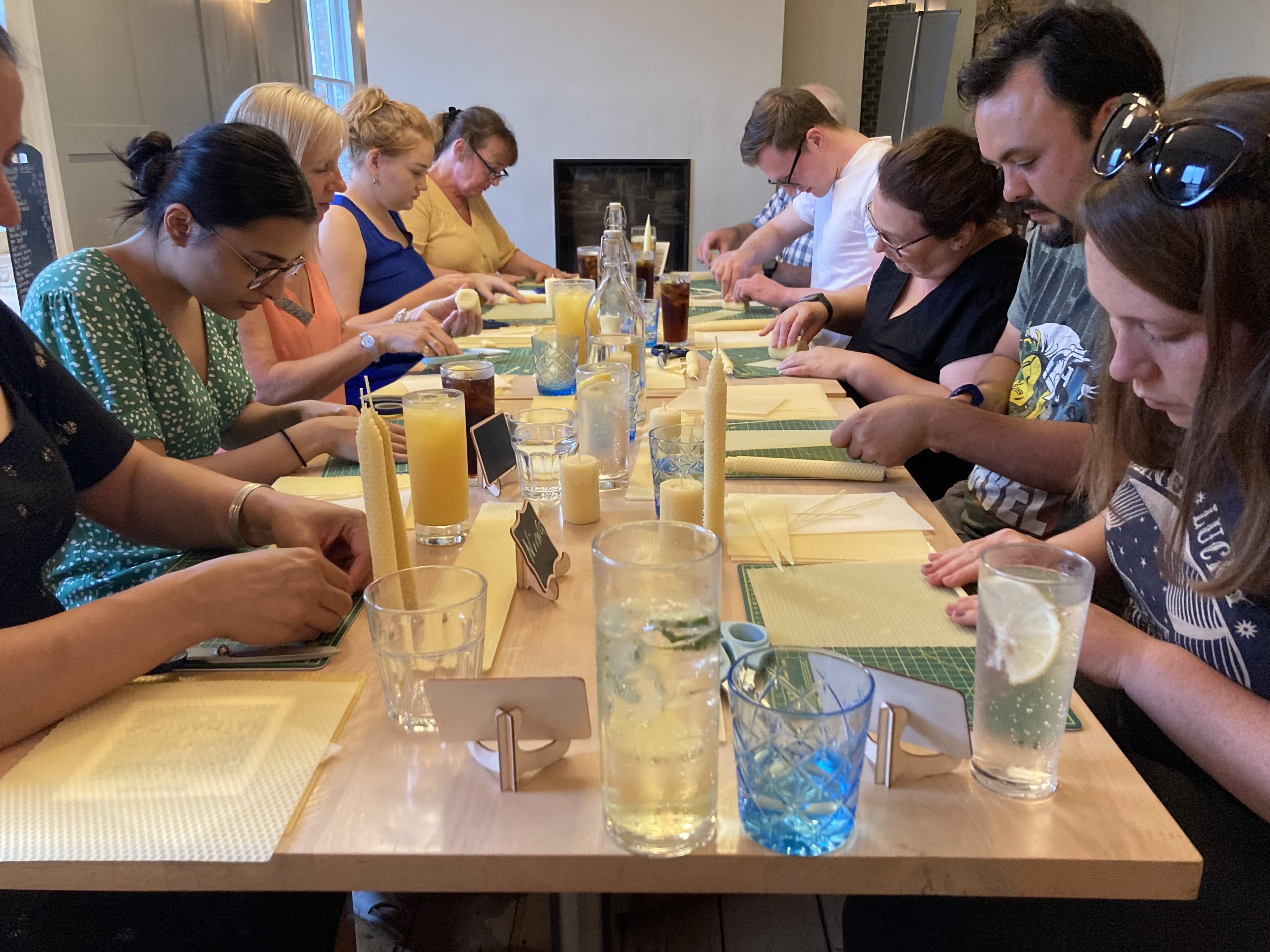
For Logan, practical requirements include great audio-visual equipment and a gaming area that can easily be transformed. “My advice would be to do a lot of research and check out online reviews from a customer’s point of view and also from the staff’s point of view.”
He also strives to identify venues that fit the event’s brand. “We’re all about mixing our retro gaming events with the modern elements of the venue – that’s why we look for stylish spaces like rooftop bars that have amazing views of London.”
Finding a venue that aligns with your values and thinking carefully about the places you want your event to be associated with is also essential for Viki, “I couldn’t run my cooking class somewhere that’s not up to scratch, but I’ve eaten at the venue, I know the chef and I know it’s good quality food. So it’s a good match.”
- Draw up an agreement
Identifying potential venues and building trust can take time, but it’s worth putting in the effort – whether you want to build a lasting relationship with one venue or a number of venues. And, once you’ve found a place you want to work with, Viki says it’s essential that you talk to the person you are going to rent a space from and define the terms of the arrangement.
“This means both parties need to be honest about their needs and expectations, and respect each other’s boundaries. By day, I work for a law firm – I’m in compliance – so I know it’s important to ensure you do everything you can to ensure no disagreements arise later down the line. I build trust by making sure I leave everything clean and as I found it, and beyond the agreement, we make sure we communicate regularly. For example, if there are any changes to the way an upcoming event is being run or if I need some extra space in the fridge.”
And while Viki packs up her car with boxes filled with ingredients and pre-prepared snacks for every event, she has the opportunity to use the restaurant’s cutlery, and crockery. “It’s a lifesaver for me because then I don’t need to supply these things, and if I forget something like a bowl, I can find whatever I need.”
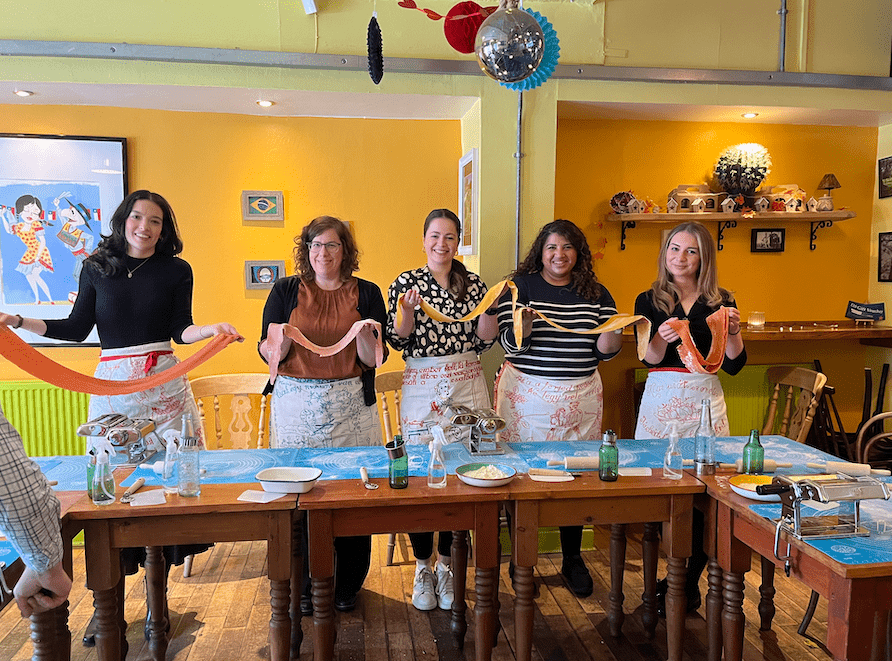
For Logan, this extra support supplied by the venue includes staff. “It’s very rare that we would hire our own staff. Instead, we rely on the team that’s available, which represents a massive saving.”
- Take advantage of every opportunity
From spotting a gap in the market to building a community, collaborating with local restaurants, cafes, bars and pubs to host events means being open to opportunities. For Logan, this meant tapping into the popularity of brunch events, which have taken off over the past few years, and therefore catering to a new audience.
“We started out in Shoreditch, targeting the after-work crowd, and then expanded to venues in Clapham about a year and a half later, where we were focused on pre-party, weekend events with a club night or silent disco after the gaming.” But a growing interest in daytime events encouraged him to launch bottomless brunch packages. “We tapped into our existing audience from previous events, and I’d say the crowd is now typically 50% repeat attendees while 50% are an entirely new audience who just want to come for a more chilled, daytime party.
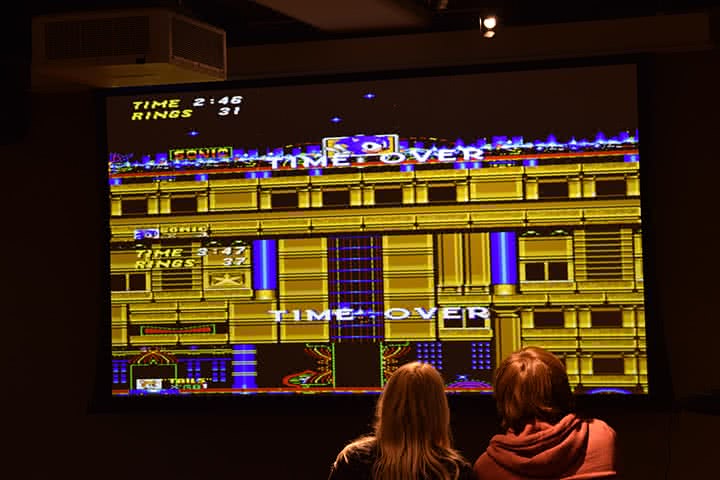
@REZtron
Similarly, Catherine says the flexibility and lower overheads associated with F&B venues have allowed the team to be a bit more experimental. “If we’re running a new workshop and we’re not sure how popular it will be, it’s a lot less pressure to reserve a table in a pub as opposed to booking a more formal space and paying quite a lot of money.”
While Viki acknowledges that, while it’s tempting to wait for the perfect scenario, you risk limiting yourself: “Be open-minded and look at your network. If you can see a link to what you offer, or the chance to support a cause within the local community, then go for it. By getting myself out there and talking to people about what I do, I would say 80% of my business is the result of people approaching me.”
- Demonstrate value to attendees and venues
“Right now, restaurants and bars need business more than ever, so it’s good to take advantage of venues during the hours they aren’t open or are quiet,” says Logan. “While for attendees, a package that includes retro games, a live DJ and brunch will be a lot cheaper than if they were to pay for these experiences separately. Plus attendees tend to stick around after playing our games for another two or three hours, which means they’re going to spend extra and that’s definitely a great advantage for venues.”
In other words, it’s about pitching the advantages to venues while ensuring attendees feel they’re getting their money’s worth. And, for Catherine, added value means buying every attendee a drink and factoring that into the ticket price. “There’s the risk someone will order something expensive, but that way we guarantee income for the pub. We’ve used a few places in the past where you pay a hire fee and provide the drinks, but we want our tickets to be priced at a level that’s accessible to most people, so we can’t really pass on that expense.”
In addition, she says, venues know they have to offer more than simply being somewhere people go to for food and drink, and by hosting diverse events, they might just have the upper hand over local competition. “We remind venues that it’s not necessarily what they are getting today, it’s what they are getting long-term.”
In other words, events raise awareness among people who might not otherwise have heard of them, but who then go on to plan a return visit.
- Think about marketing at every stage of your event
Two words: social media. Don’t underestimate what a simple repost or tag can do when it comes to reaching new audiences, building credibility and establishing trust. Mastering social media for events means promoting ticketing sales, capturing photos and videos during an event, inviting user-generated content through use of a hashtag, and following up with attendees to receive their feedback. And all three creators agree it’s a powerful tool. “The venue can share our posts to highlight what’s going on and show their followers what’s happening, while we share their updates on our channels. It’s mutually beneficial and by doing this we usually each gain a few followers and it’s good PR for us both,” says Viki.
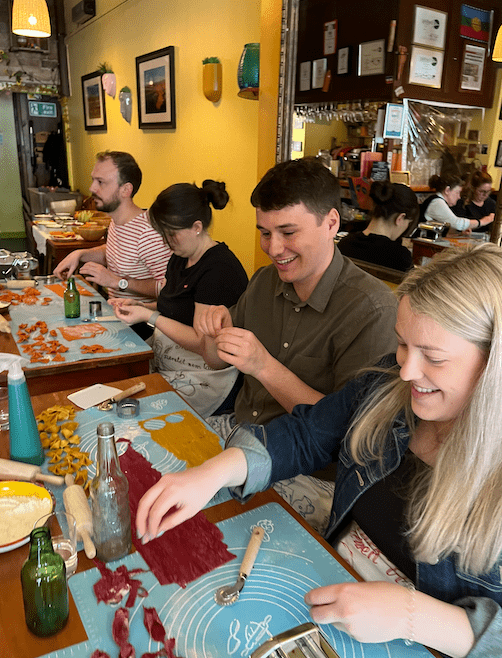
In addition, make it easy for people to spot one of your events while it’s taking place. “When we take over a corner of our pub, our banner makes it clear to customers what’s going on. And we always have fliers with us to hand out to people if they are interested,” says Catherine.
- Keep evolving your offer
We’ve already mentioned audience feedback, and it’s by listening to the needs of the market and her attendees that Viki is in the process of adding new elements to her classes that benefit both her and the owner of the restaurant where she hosts her events. “We had a hen party that wanted a cocktail-making class at the end of my pasta-making session, and that’s led us to think about teaming up and combining our skills to put together a package. The attendees get more of an experience, while the venue has the opportunity to earn more money beyond the rental.”
While for Logan, free events have proved to be not only a great way of testing and trialling fresh ideas but also a useful marketing tool. “We have the opportunity to show off what we can do, while using a venue that might normally be empty. And by having people register through Eventbrite, we got to benefit from a lot of data collection that we can leverage when it comes to promoting future events.
Found the ideal venue for your next event? Start planning it here.
